“Anything to avoid falling into the hands of the Russians”: Lindgren’s diary for 1944
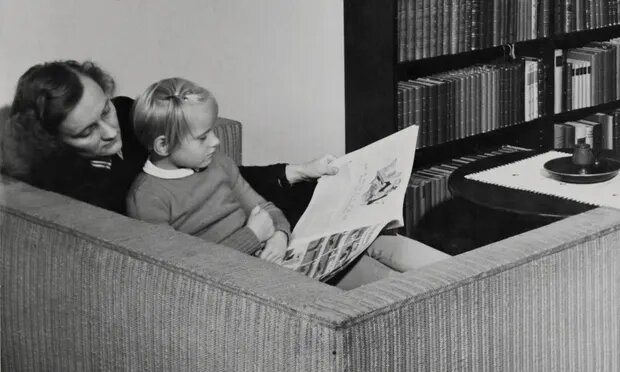
1944 Part 1
January 7
I haven’t recorded anything in this new year yet; There was no time. And she didn’t cut out some “1943 review” from the newspapers. But I bet all my money on the fact that the coming year will be a “year of peace”. In 1944, peace must finally come and this anarchy must come to an end.
The day before yesterday, Sveriges Radio announced that Kai Munch, a cleric and poet, had been kidnapped from his home in Vädersø, shot in the head with a pistol and thrown into a roadside ditch. It’s sad and sad enough to make you want to cry. The number of acts of violence in Denmark is increasing every day, and it seems that it is worse than ever.

Kai Munk is a Danish writer, poet and Lutheran pastor. As an anti-fascist, he called for a fight against the German occupiers. In early January 1944, he was arrested by the Gestapo, killed on a deserted road and thrown into a roadside ditch. To knock off the trail in his coat, a note was planted on him: “Pig! You worked for Germany!”
The other day it was reported that the Russians had reached the old Polish border, which they had abandoned in the first week of the German-Russian war. Every communiqué speaks of a German withdrawal to pre-prepared positions, a planned withdrawal, but all the time a retreat, a withdrawal, and only a withdrawal.
Now my children and I are in Nes. This time everything is not as beautiful as last year, when the forest around was like a fairytale, with a thick layer of snow on every branch and bush – this year there is no snow at all. But it was still great, especially on New Year’s Eve when I spent some wonderful hours skating on the frozen river with Karin, Gunvor, Barbro and Karin Karlsson.
Finnish writer Hella Vuolijoki received a life sentence for spying for Russia.
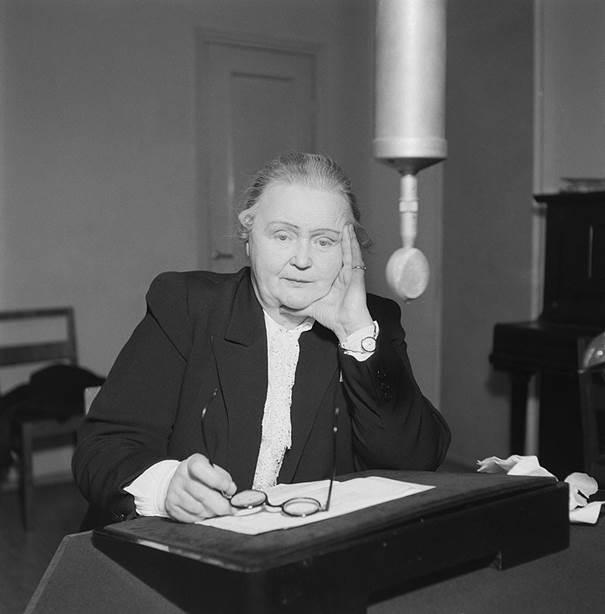
The Finnish writer Hella Vuolijoki always gravitated towards the left and had extensive connections among the Bolsheviks in the USSR. They say she worked for Soviet intelligence. In 1942, she hid a Soviet intelligence officer who had been abandoned in Finland, for which she was arrested by the Finnish special services in 1943 and sentenced to life imprisonment. After the armistice of 1944, she was released from prison and even returned to Finnish politics. Of course, thanks to the authority of the USSR
January 14
I was going to paste some newspaper clippings about the murder of Kai Munch, which still shocks and upsets people, but I lost them. Therefore, I will try to reconstruct the newspaper version of events from memory. And so, Kai Munk, who lived and worked in the small, insignificant parish of Vedersø, but whose words spread far beyond the boundaries of the parish and the country, was with his wife and children in a country house outside the city on that ill-fated day. When they returned home in the evening and sat down to dinner, two or maybe three uniformed men showed up and said they had a warrant for Munch’s arrest. He took a small bag, got into their car and drove away, and was later found lying in a ditch with a bullet wound to the head. According to today’s newspapers, during the investigation it turned out that this was done by members of Fritz Clausen’s party.

Fritz Clausen is a Danish Nazi and head of the DNSAP (Danish National Socialist Workers’ Party). After the war, he was arrested for collaborationism, but died in prison in 1947 of a heart attack
In Italy, the old fascists who overthrew Mussolini in July have been tried, and the verdicts have already been handed down. Most of them received the death penalty, including old Ciano, whose sentence has already been carried out. Ciano wanted to be shot from the front, with his eyes open. According to yesterday’s paper, Edda Ciano, Mussolini’s daughter, denounced her own husband. As for me, all this looks very much like Ancient Rome.
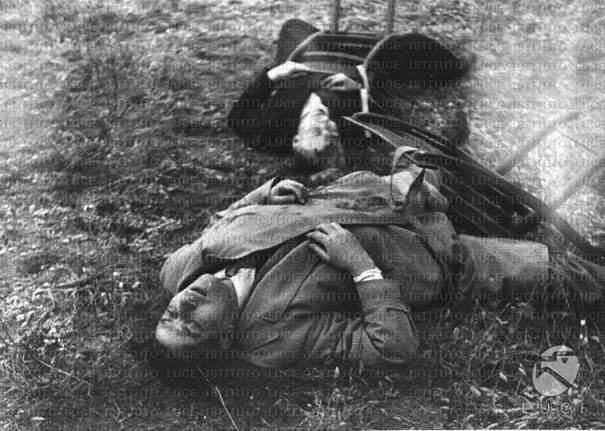
Mussolini’s son-in-law, Count Ciano, after his execution. The convicts were tied to chairs while sitting, and the firing squad was positioned in the back
January 23
Since my last entry, there has been a great commotion between Russia and Poland as to their future boundaries; As might be expected, the Russians were not ready to meet the demands of the Poles.
In Russia there is now a struggle for Leningrad; It seems that the Germans are surrounded there. In Italy, the Battle of Rome is expected any day now.
I’m sure there were other things that happened, but I don’t remember them now.
Oh yes, the Allies are closing in on Rome.
And Argentina broke with the Axis. The same Argentina that was long considered a loyal stronghold of the Axis, but is now finished. A letter to Axis “agents” in Argentina has been intercepted, but the Germans claim it is a forgery.

Winter 1944. The Germans, following the Tiger, make their way through the ruined Italian town. Lindgren was wrong: in the winter of 1944, the Allies were still far from Rome…

A ruined ancient monastery on Monte Cassino. It was part of the defensive chain of the German “Gustav Line”. It was here that the Allies were halted for a long time in the winter of 1944. They arrived in Rome as early as June 1944, after long and exhausting battles with the Germans, who knew how to defend themselves well
February 6
Nordal Grieg, who fought on the side of the free Norwegians based in Britain, is killed.
10 German divisions are surrounded near the Dnieper and are in danger of being destroyed. They are connected to their own only by an air bridge. Their commander flew to Hitler and asked for permission to surrender, but Hitler said no. The Russians have come close to the border of Estonia and the Estonians are fleeing en masse to Finland and Sweden. Many people cross Gotland in small boats. Anything but fall into the hands of the Russians!
At the moment, we have 40,000 refugees in Sweden. I don’t know if I’ve written about the “police training” of Norwegians in internment camps. That’s what it’s called, and in practice, it’s regular weapons training and military training. I read in the letters of the Norwegian refugees that they wore British military uniforms and were commanded by British officers. A letter from a certain Georg von Wendt said that the German deportation was a direct response to our military training of Norwegian refugees. The deportations continue, and Sweden does nothing and cannot do anything. Although we are protesting loudly in the diplomatic sphere. The refugees here don’t like us very much, but that’s probably quite natural. Being a refugee is sad and all the irritation is directed at the locals. The Norwegians seem to be particularly resentful of us [Of course! Who helped to move German troops across their territory during the German conquest of Norway? Who provided their territory for transporting wounded Germans back?]
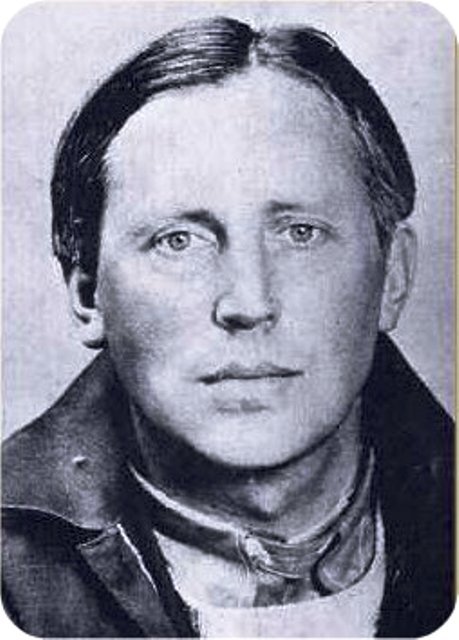
Norwegian writer, poet and playwright Nordal Grieg. After the occupation of Norway, he joined the Resistance and moved to England. In 1943, he asked to join a British bomber as a passenger – he wanted to personally observe the bombing of Berlin. Unfortunately, during this raid, the plane was shot down by the Berlin air defense and its entire crew, including the writer, was killed
February 8
The day before yesterday, when I made my last entry, it was reported on the evening news that about 200 Russian planes had bombed Helsinki, causing great damage. It is believed that this is the beginning of the Russian campaign to force the Finns to peace. In the letters and other materials, the fear of the Russians becomes more and more evident.
Yesterday, Elsa Gullander told us that she received a call from the Finnish Aid Society asking if she could take Taina back to her home. “This may be preferable to forced resettlement,” they said, adding that if things in Finland go according to a catastrophic scenario, Sweden will take in another 800,000 Finnish refugees. The whole of Karelia is being evacuated again; What an incredible suffering for the Karelians, who returned to their old lands with great hope after the ousting of the Russians. It is terrible to think about the fate of Finland – and poor Baltic! Russian submarines have again entered the Baltic Sea and our merchant ships They are forced to walk under the protection of convoys. All the elderly and children were evacuated from Helsinki, and schools were closed. Thinking about the future makes me anxious, and we in Sweden will also have to face the hardships of life, it cannot be that we will always remain completely calm here.
Peace, when it comes, may not have to rejoice, but rather the opposite. Even before that, many small countries may be forced to exchange their freedom for a life of perpetual slavery.
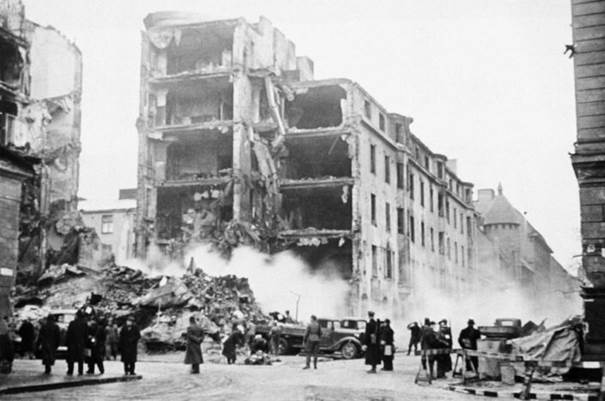
Helsinki in 1944
February 17
The newspapers trumpet that Helsinki is being brutally bombed by the Russians. And former Minister Paasikivi is in Stockholm, torn from his inviolable private life, to discuss peace with the Russians. At least, that’s what the rest of the world thinks, though he stubbornly insists he’s here privately. But the idea of a Finnish-Russian world is now in the air; Maybe it will even come again on March 12 [as in 1940], who knows?
Berlin is still being bombed. I’m reading “Yesterday’s World” by Stefan Zweig; it’s been several years since he, a refugee, committed suicide somewhere in South America. He lived through two world wars, as well as the happy times before the First World War, when the illusions of humanity were still hovering. It’s a sad book, especially because deep down you always remember the bitter fate of the author and know that it was shared by countless other people, perhaps as kind-hearted as he seemed to be.
Tonight I have time to work quietly on the book. Sture is in Gothenburg, Lars is doing her homework in her room, and Karin is sick and has gone to bed. She is going through some kind of nervous crisis, which is expressed in an exaggerated attachment to me and anxiety that something might happen to me. This anxiety comes over her only in the evenings. On Tuesday, Sture and I went to dinner at the Viridens’ house. on Ellie’s 40th birthday, and when I went to say goodbye to Karin, she said, “You’re saying goodbye like you’re not going back!” And when I came back, she was wearing my dressing gown. I just hope it’s just such a period.
Ellie’s dinner was a success. Among the guests were the Gullanders, Ingman, Abrahamsson, Evos, and Palmgren, as well as Hultstrand and a certain Miss Nyberg. Ziggy invited me to dinner. I have to write down what we had, partly because I like to write about food, and partly because in times like this now, you never know how long we’ll be able to continue eating like this in Sweden. So: three sandwiches with a cocktail, mushroom crustad, asparagus soup with cheese sticks, turkey with vegetables, ice cream and hot chocolate sauce. Sherry for soup and dessert, red wine for turkey. And then a late dinner: meatballs, mushroom omelette, salad and herring gratin. We were dancing and having fun, and at two o’clock in the morning, the tenants of the neighboring apartment called and complained, because by that time we were dancing a polka, which made the whole house shake. Okay, enough about that, I went to bed.
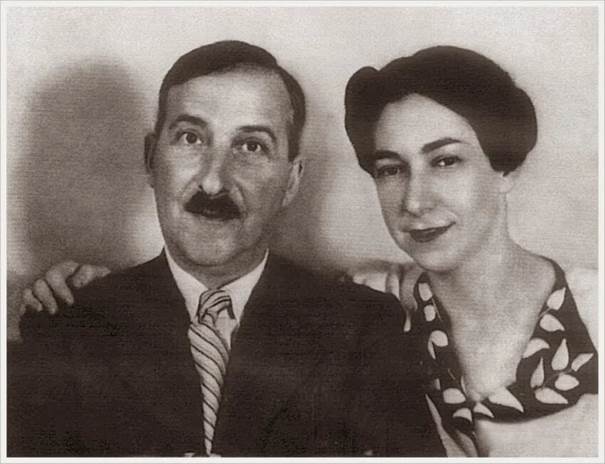
Stefan Zweig with his wife. In 1934, in anticipation of Hitler’s occupation, they left Austria and moved first to England, from there to the United States, and then to Brazil.
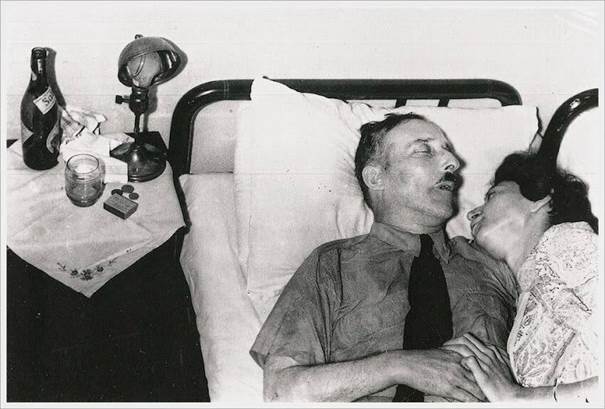
In a state of deep depression in early 1942, they decided to voluntarily end their lives. They were found together, holding hands…
February 23
Last night, when I had to go to work, Karin, as usual, was afraid that something might happen to me. I told her not to worry, nothing would happen in our peaceful country. “If we lived in a country where there is a war, where there are bombs,” I said, “it would be a very different thing.” I went to work, and the 10 o’clock news reported that an unknown plane had just appeared over Stockholm and dropped a load of bombs on Hammarbühuiden, then flew over Södertal and Strängnäs and dropped more there. There were no air raid warnings (because the plane was giving SOS signals). I’m grateful, that the bombs didn’t fall here in Wasastan because it would have caused serious damage to Karin’s nervous system. I hid the newspaper from her this morning, so she still doesn’t know about it. The planes were Russian.
At the moment, Karin and Lars are on vacation, although Karin only has three days. Lars went on a school field trip to Enaforce. Karin spent part of the time in bed with a cold, but we managed to ski with her. Elsa-Lena, Matte and their mothers came today. The children were skiing. The sun was shining beautifully.
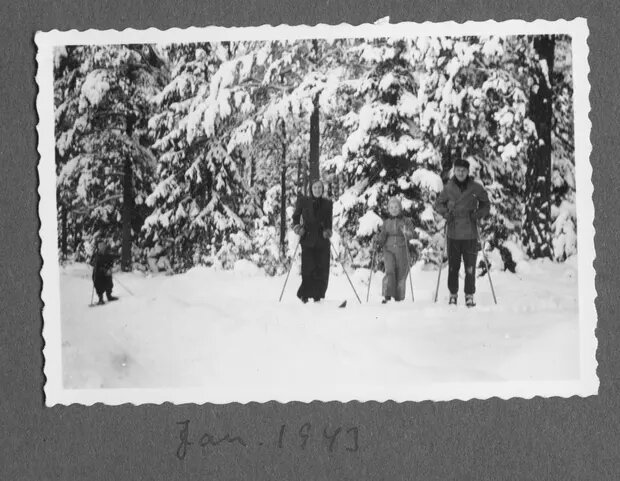
The Lindgren family on skis. January 1943
March 3
As follows from the above article, peace between Russia and Finland is just around the corner. But Finland has its doubts – and no wonder! Norwegian and Danish refugees express their contempt for our horror of the Russians, but we know it is justified.
[Excerpt from Dagens Nyheter, March 1, 1944: “Moscow is ready to receive the Finnish delegation. Russia reveals its conditions.”]
A translation of a letter from a Latvian wife to her husband in Portugal (smuggled out) tells of what it is like for people in Latvia today (where, after all, they have to put up with the Germans).
[A typed transcript of a letter from Astrid’s work at the censorship office is pasted here.]
And now the Russians are approaching their border. When the Germans collapse, the Baltic states will have no hope left, as far as we can tell: poor people.
Tage Bögstam told us that poison was distributed to the population so that they could kill themselves in case of the worst. And I can’t shake the feeling that this will be the case!
March 20
Either nothing special happens in the war, or I’m too lazy to write. The most notable thing at the moment is the peace talks between Finland and Russia. They have been going on for some time, but to no avail. The Finns refuse to concede despite pressure from the UK and the US. This whole story seems quite mysterious to me. Finland has a knife to her throat one way or another, and will undoubtedly have to agree to the Russians’ terms in the near future. King Gustav apparently contacted Mannerheim and Ryti and urged them to conclude a peace agreement.
On the home front: Karin has measles, very severe, she has not yet been allowed to get up. I’m having a lot of fun with PippiLongstocking for now. [She was writing this fairy tale at the time.]
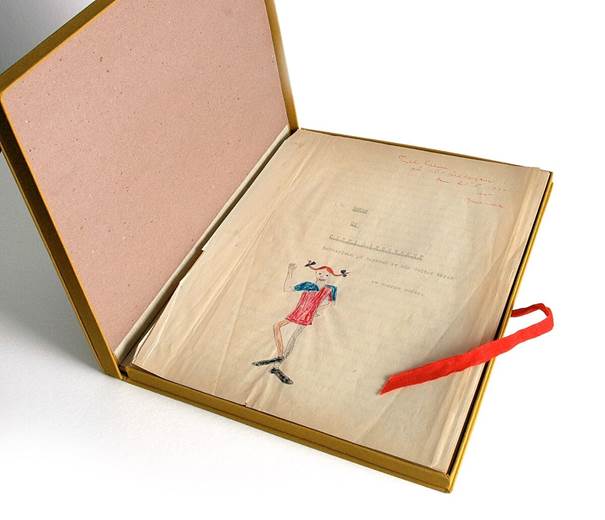
On May 21, 1944, Astrid Lindgren gave her daughter Karin a manuscript with stories about the adventures of Pippi Longstocking for her birthday. The manuscript was packaged in a beautiful box and decorated with Astrid’s own drawings (pictured)

Lindgren wrote this fairy tale quite by accident when she was sick, deeply depressed, and bored, in order to entertain her capricious daughter
March 21
I don’t think I’ve been following the Finnish-Russian peace talks as I should have; I don’t think I’ve even written anything about Russia’s conditions. Basically, they boil down (as far as can be judged) to the 1940 border and the internment of all German troops in Finland, with the help of Russia if necessary. So far, Finland has answered “no”, wanting to define the conditions more precisely first. But the Russians want them to capitulate first, and then argue. Given the Finns’ distrust of Russia, it is not surprising that the Finns want at least some guarantees first.
April 1
Many are now receiving draft notices. Sture came home the other day and said that the Germans were planning to occupy Finland as well as Hungary, but I hope this is not true. I’m so sick of this war that I can’t bring myself to write about it. What’s more, I’m lying in bed with a sprained leg. Boring!
April 4
Today is exactly 13 years since I have been married. Meanwhile, the beautiful bride lies in bed, which becomes monotonous over time. I like it in the mornings when they bring me tea with a French bun and smoked brisket, when they change the way and clean up after me, but I hate it in the evenings when they put a hot compress on my leg and everything itches. Sture sleeps next to me And I can’t sleep. I’m reading Maugham’s On Human Slavery and working on Pippi’s Longstocking.
It doesn’t look like there will be peace in Finland. Now there is some kind of children’s program on the radio, so I can’t write anymore.
Perhaps my diary has a disproportionate amount to say about the atrocities of the Germans, because Dagens Nyheter, our daily newspaper, is as anti-German as any other, and never misses an opportunity to report on the atrocities of the Germans. However, there is no doubt that such atrocities do take place. Nevertheless, at the end of this note on Poland, it is said that the Poles “would prefer the German regime” to the Russian. “if there were no other choice.” Probably, this is the opinion in the Baltic States and in some others, but it must be an editorial mistake to have such a thing in Dagens Nyheter.
[Excerpts from Dagens Nyheter, April 5, 1944:
“Executions in the Streets of Warsaw”;
“Warsaw children are getting together in gangs”: children are neglected, stealing weapons; prices are rising; separate cinemas for Germans and Poles;
“Prominent Hungarians in concentration camps, others taken to Germany as hostages.”
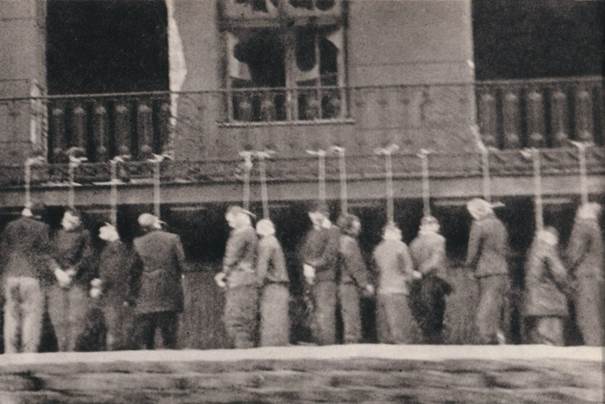
One of the typical Warsaw paintings, so often seen in the Polish capital of 1943-1944 (before that, the Germans tried to hide executions in prisons and concentration camps). In this case, those hanged on one of the houses (for an attempt on the life of a high-ranking SS official) are hostages who accidentally came to hand. In total, during the years of occupation in Warsaw, tens of thousands of such citizens were shot and hanged, accidentally caught on the street. According to the Swedish newspaper Dagens Nyheter (which Lindgren apparently shared), the Poles would prefer to remain under the Germans. Western idiocy of the highest standard…
April 16
The battle for Sevastopol, the last German stronghold in Crimea, had begun. The southern front looks unstable, and I must say that the Russians are already near Romania – they will soon begin to threaten the supply of oil to Germany. They also crossed the Czechoslovak border. The Allies reproach us and other neutral states for supplying goods to Germany. And they send us indignation dispatches endlessly. But it doesn’t bother us.
We celebrated Easter according to our custom. There is a lot of food on Swedish soil, and I will now write down what we had on the table as a guide for future Easter eggs. On Good Friday, there is a completely unconventional veal liver, on Easter Saturday, as usual, eggs and schmorgosbord (homemade liver pate, herring salad, pickled Baltic herring, cold poached Baltic herring, salted herring, smoked venison, boiled ham with beetroot and I don’t know what else) and ice cream for dessert. Sture and I drank a gorgeous sherry, because on this day, not the 4th, we celebrated our wedding anniversary. On Easter day we had fried chicken and on Easter Monday we had pork chops.
On Easter Saturday, Lasse announced that he had received an invitation to dance with a girl in Tureberg. I told him he had to be home by 1 p.m., but he didn’t come back until 4 p.m. I was beside myself and called all his friends. From Göran, she learned that he had been at the Winter Palace with a girl named Britta Kaisa Falk.
Karin is nervous again and has had a lot of trouble with her at Easter. It’s a little better now; I think it must be the aftermath of measles, although of course she was a little crazy before. Since I’m tied to the apartment because of my leg, she doesn’t worry about me, but her mental state is terribly unstable, fluctuating from nervous and elated to deep despondency and whining about school and having to play the piano. I’m feeling pretty depressed myself, probably because I haven’t been able to go outside for three weeks now. And I pray to God that Karin will get well as soon as possible, because it’s terrible when she’s in this state, and I feel so sorry for her. Lasse lives on a grand scale, and it seems that he is always invited somewhere. He can’t sit at home, which seems to upset me too.

Lindgren with her daughter Karin (post-war photo)
April 23
On Saturday evening, Moscow radio read out a statement about Finnish-Russian peace talks. It stated that Finland’s reply of 8 March had been found to be unsatisfactory and that Russia’s terms, which had been handed over to Paasikivi, represented its minimum demands. The Finnish delegation then went to Moscow and held a conference with Molotov on March 27-28. The following conditions were set for the delegation:
[Excerpt from Svenska Dagbladet, April 23, 1944: List of Seven Conditions plus a Short Accompanying Article, “Russia’s Sharp Statement on the Finnish Question.”]

Astrid Lindgren with her daughter Karin in Moscow (early 90s)
